When Welcome to Night Vale premiered its pilot episode in 2012, there was plenty to hook listeners, as Cecil Baldwin’s mellifluous voice speaking Joseph Fink and Jeffrey Cranor’s distinctive words immediately crafted an eerie atmosphere of familiar but not. But there was something else that made a compelling first impression: Cecil’s loving descriptions of Carlos, the scientist with the perfect hair. Queer representation on the fictional radio, as matter-of-fact as everything else in Night Vale.
Seven years on, queer characters are found in every corner of the expanding audio drama world. So this list of recommendations is by no means exhaustive; it is simply one starting point based on the SFF series I’ve laughed, gasped, and teared up at. From radio-show hosts caught up in romantic fanfic tropes to stories that aren’t about ships but just about being a queer person in the world, these eight fiction podcasts are something to be proud of.
Kaleidotrope

Drew is just minding his own business running the college radio show when in comes his new co-host, the annoyingly bubbly Harrison. But Drew shouldn’t be surprised by this meet-cute; after all, they are at Sidlesmith College, the magical campus full of romance tropes and maybe even a happily-ever-after. As Drew and Harrison reluctantly co-host a text-in advice show, counseling their listeners on everything from fake relationships to the upcoming Rose Dance, their own attraction grows harder to ignore. But is it the real thing, or are they just subject to Sidlesmith’s kaleidotropic magic?
Created by fanfiction writers Aja Romano (also a culture reporter at Vox) and EarlGreyTea68, Kaleidotrope will especially appeal to those who came of age or were most active in fandom in the early 2000s, while still inspiring works and commentary from all generations of fans on Archive of Our Own and Tumblr.
The Bright Sessions

Remember that moment in X2 where Bobby’s parents ask him, “Have you tried not being a mutant?” and, considering the character’s comic book history, it’s kind of a double entendre about the teen’s sexuality? In The Bright Sessions (which can be summed up as “what if the X-Men went to therapy”), empath Caleb doesn’t have to answer that kind of question. He’s an Atypical, like all of Dr. Bright’s patients, and spends his sessions figuring out how to survive high school dealing with the extraordinary onslaught of emotions from his peers… including that cute guy Adam.
Caleb and Adam’s relationship progresses naturally, as they bond over stakeouts and mature through their interactions with one another. Any misunderstandings or obstacles are treated as opportunities to get to know each other better, rather than excuses to derail their romance. (And soon we’ll get to read more about how this came to be, outside of Dr. Bright’s office, in creator Lauren Shippen’s novel The Infinite Noise.) Further, the m/m love story isn’t the only queer representation in the series; Chloe, another Atypical who can read thoughts, is asexual.
Buy the Book


The Infinite Noise
The Far Meridian
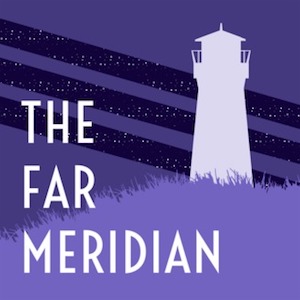
Peri (voiced by creator Eli Barraza) is the agoraphobic sole inhabitant of a lighthouse—the only one who stayed after everyone left, including her missing brother Ace. But one morning, Peri wakes up and the lighthouse is in a new place: somewhere foreign or alien, often somewhere scary, but also somehow more manageable than the recognizable world Peri has been too frightened to explore before. Because so long as she knows that her home moves with her, it’s easier for Peri to take a few steps outside of the lighthouse. And then a few steps can become whole strides out into the world… and maybe eventually bring her to Ace.
Unlike some of the more plot-heavy other audio dramas from the Whisperforge collective (ars PARADOXICA, Caravan, Startripper!!), The Far Meridian is more atmospheric character study bookended by Lost-esque weirdness. Similarly, Peri is queer, but potential romances (or even the Peri/Ruth OTP that’s been teased in a few episodes) are not a driving aspect of the plot. Each episode is more about the people that Peri encounters, who help her slowly deal with her anxiety and make the unfamiliar more familiar.
The Strange Case of Starship Iris
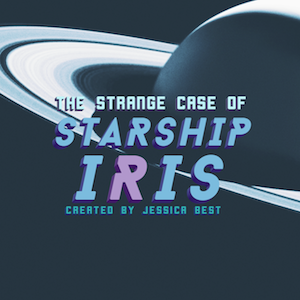
Between Starship Iris and Becky Chambers’ Wayfarers series, the growing subgenre of cozy sci-fi full of found families is a good reminder that Firefly would have been even better had anyone on Serenity been queer—plus they could have used some excellent drinking songs, like the crew of the Rumor.
In 2191, two years after the Intergalactic Republic won a war against the alien Dwarnians, biologist Violet Liu is the sole survivor of a mysterious explosion that destroys the eponymous research ship the Iris. Upon getting picked up by the Rumor, Violet finds herself in the company of not exactly space pirates, but certainly disreputables in the eyes of the Republic. The crew is wonderfully diverse, especially in the sweet relationship between transman Brian Jeeter and nonbinary pilot (and Dwarnian) Krejjh.
But before this becomes an ensemble series, the pilot is just a conversation between two people floating out in the black. This spare, lovely exchange builds the foundation of my OTP for the series, Violet/Arkady, making their prickly slow-burn even more compelling as the first season unspools.
Caravan
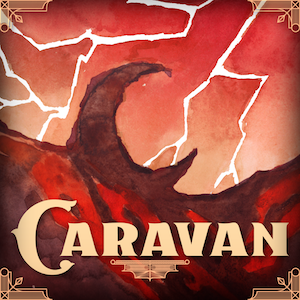
Imagine if more of Buffy the Vampire Slayer’s human-versus-demon showdowns actually occurred inside the Hellmouth… and if the Chosen One were not a white cheerleader but an awkward queer Desi guy… but with about the same level of human/demon thirstiness. When Samir falls into a canyon on a hiking trip, he discovers an entire weird West world brimming with demons, bounty hunters, trans cowboys of color, vampires, and other supernatural creatures. Getting out of Wound Canyon isn’t as easy as falling in, as Samir and his caravan of new friends turn their eyes even further downward, to the hellish depths of the canyon and its demonic inhabitants who they might have to fight, or…
Listen. There’s a reason this was dubbed “The Horniest Podcast of 2019” by The AV Club. Creator Tau Zaman depicts all possible dimensions of an adventure like this, from making an uncomfortable bargain with a banshee in order to save your life to giving in to some Spuffy-inspired curiosity. There’s even explicit queer sex in a later episode, a rarity for the medium, as it is notoriously difficult to make the sound of people smooching (etcetera) sound sexy. “I don’t wanna be some blank slate protagonist,” Samir explains of his often impulsive yet brave decisions in the canyon. “I wanna make moves. I wanna matter.” And by season 1’s hell of a cliffhanger, he does.
Kalila Stormfire’s Economical Magick Services

While this urban fantasy fiction podcast is set in the magickal world of Brushland, the stakes are very much grounded in our world: Kalila Stormfire (creator Lisette Alvarez) is a queer Latinx witch trying to set up shop as the local witch in her multicultural, working-class neighborhood, only to come up against the coven that rejected her and an anonymous critic leaving bad reviews on her fledgling business. Alvarez has modeled much of the series after their own experiences, from Kal’s upbringing to her cases, each of which (Embodiment, Dreams, etc.) is based more on reflective personal growth programs than on something you would find in, say, the wizarding world. And where Alvarez’s experience falls short, they hire sensitivity readers to consult on characters like black nonbinary witch Desiree, who is voiced by nonbinary performer Zayn Thiam.
Moonbase Theta Out
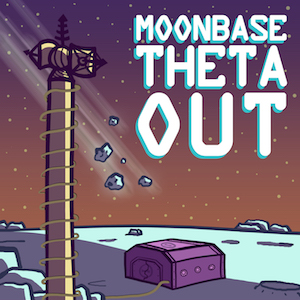
Going into Monkeyman Productions’ inaugural fiction podcast, knowing that it concerns a decommissioned corporate Moon base counting down its final weeks of operation, one would expect a bleak science fiction story about loneliness and the evils of capitalism. Instead, it’s hopeful. This is a credit to creator D.J. Sylvis’ scripts and lead Leeman Kessler’s performance as Roger Bragado-Fischer, the series’ sole voice (at least, for season 1) and Communications officer at Moonbase Theta.
In bite-sized episodes averaging five minutes, Roger makes every second count—including his federally-allotted handful of moments to append a personal message to his husband Alexandre, waiting back on Earth for his return. Over twenty weeks, Roger reads his husband poetry, teases him about adopting puppies, and otherwise folds more fondness into a few breaths than most people can fit into pages and pages of love letters. Which makes it all the more devastating when the shutdown doesn’t go as expected.
The Two Princes
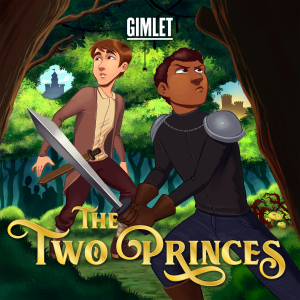
Gimlet Media’s collaboration with The Trevor Project is a family-friendly fairytale riff about Rupert (Noah Galvin) and Amir (Ari’el Stachel), princes from warring lands who follow an ancient prophecy into the magical woods slowly encroaching on their respective kingdoms. While the story beats and performances (from supporting cast Christine Baranski, Shohreh Aghdashloo, Samira Wiley, and more) veer towards the cartoonish, Rupert and Amir’s dynamic is fascinating, as two royal heirs fighting their growing affinity for one another for more reasons than one.
The trope of the prince stuck at a ball, uninterested in auditioning lovelorn princesses to be his wife, is even more resonant when that prince has not yet accepted that he might not be interested in a wife at all. While I would have loved to see Rupert and Amir act on their attraction earlier in the series, the fact that the podcast doesn’t shy away from this love story—and that it’s part of a larger dismantling of toxic masculinity and outdated gender roles for the aforementioned princesses—makes it an excellent offering for kids and their parents.
Natalie Zutter is working on her own queer post-apocalyptic audio drama, but in the meantime you can listen to her Black Mirror-esque one-shot “Proxies” or her standalone true crime riff “Not Your (Final) Girl.” Share your favorite fiction podcasts with her on Twitter!










